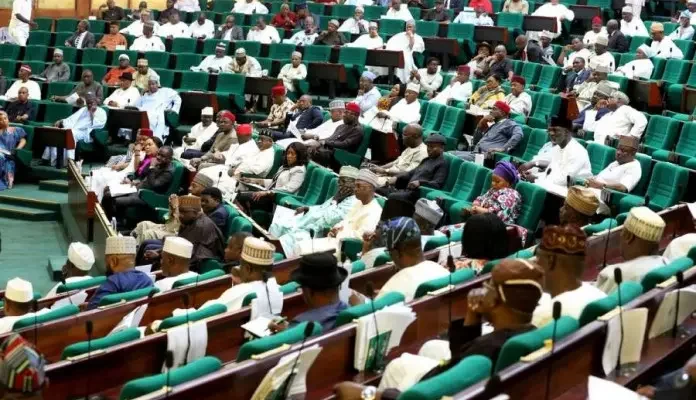403
By Tracy Moses
The House of Representatives on Tuesday, rejected a constitutional amendment bill proposing the rotation of the offices of President and Vice President among Nigeria’s six geopolitical zones.
In a similar move, lawmakers voted against another bill seeking to strip the Independent National Electoral Commission (INEC) of its powers to register and regulate political parties across the country.
These two were among seven constitutional amendment bills slated for debate on the Order Paper. Ultimately, five of the proposed amendments were voted down during the plenary session. However, following a point of order raised by Deputy Minority Leader, Rep. Ali Jesse, citing Order 9, Rule 6, the House resolved to revisit the rejected bills on Wednesday. The cited rule requires that any motion to rescind a vote must be presented as a substantive motion on notice. In response, Speaker Tajudeen Abbas directed the Committee on Rules and Business to re-list the bills for consideration on the next legislative day.
Earlier, the House had suspended its rules to permit a concurrent debate on all seven bills, allowing members the flexibility to speak on any of the proposals.
The bill on rotational presidency attracted the most debate and opposition. A majority of lawmakers argued that enshrining zoning in the constitution could create more problems than it sought to solve. Leading the opposition, Deputy Minority Leader, Hon. Aliyu Sani Madaki, noted that the principles of equity and representation were already covered under the Federal Character clause. He maintained that zoning should remain a political arrangement rather than a constitutional mandate, as political parties already have internal mechanisms to promote inclusivity.
Supporting this stance, Hon. Sada Soli said while the bill was well-intentioned, making zoning constitutional could compromise merit and deepen ethnic and regional divisions. Hon. Shina Peller echoed similar concerns, warning that constitutionalizing rotation might trigger internal agitation within zones, as states might begin to struggle for dominance. “If it’s the South West’s turn, for instance, which state takes the slot, Ogun or Oyo?” he asked, arguing for the preservation of equal opportunity for all Nigerians.
Hon. Bello El-Rufai questioned how the proposed zoning would function in the event of a President’s death. He raised concerns about whether a Vice President from another zone would be expected to vacate the position mid-term, warning that such rigidity could harm national unity and infringe on citizens’ rights.
Hon. Olumide Osoba added that while the idea might appear innovative, it would be inappropriate for the constitution to dictate how political parties choose their candidates.
Nonetheless, some lawmakers supported the proposal. Minority Whip, Rep. Ali Isa, backed the idea of rotational presidency, suggesting it be extended to gubernatorial positions. He argued that fairness demands that every zone be given equal access to the highest office, and advocated for a North East presidency in 2027 to maintain national balance.
Hon. Clement Jimbo also supported the bill, saying it aimed to correct the longstanding marginalization of minority groups. He proposed the inclusion of a sunset clause to phase out the zoning arrangement once all six geopolitical zones have had their turn.
Other bills considered during the session included one seeking to establish the independence and clearly define the functions of State Auditors-General for Local Governments and FCT Area Councils to improve accountability at the grassroots level. Another proposed the creation of Ughelli East Local Government Area in Delta State.
The House also debated a bill seeking to increase the number of Federal High Court judges to at least 100, or more as prescribed by an Act of the National Assembly. Additionally, there was a proposal to expand the jurisdiction of the Federal High Court to include admiralty matters, covering shipping, navigation on inland waterways, and federal ports. One of the amendments also sought to empower the National Judicial Council (NJC), in collaboration with the National Salaries, Incomes and Wages Commission, to determine and periodically review the remuneration and allowances of judicial officers and staff.
To this end, the Speaker concurred and directed the Committee on Rules and Business to list the motion for rescission on the order paper for the next legislative day, Wednesday 14th May 2025, for further consideration on their individual merits.



